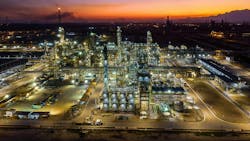Petrobras nears startup of Route 3 pre-salt gas plant, pipeline
Petróleo Brasileiro SA (Petrobras) has initiated pre-commissioning activities for the new natural gas processing unit (UPGN) at the newly renamed Boaventura energy complex (BEC) in Itaborai, Rio de Janeiro, Brazil, as part of the operator’s Route 3 integrated project (PIR3) to expand transportation and processing of associated gas from the country’s offshore Santos basin presalt (OGJ Online, Mar. 27, 2023; Nov. 7, 2022, p. 40).
After receiving authorization from the Agência Nacional do Petróleo, Gás Natural e Biocombustíveis—or National Agency of Petroleum, Natural Gas and Biofuels—for the plant’s industrial operation on Sept. 9, Petrobras began the final preparation phase for the UPGN unit, the operator said in separate releases Sept. 11.
While gas supplies will not be available to the market during this final phase of work involving calibration of processes and equipment, Petrobras said it expects begin supplies upon official startup of commercial operations sometime during first-half October.
Located at what was previously the operator’s former Comperj integrated refining complex that, in 2020, became the Polo GasLub Itaboraí hub, the new two-train UPGN—equipped with a total processing capacity of 21 million cu m/day—will receive its feedstock of up to 18 million cu m/day of natural gas from the Santos basin presalt cluster via the new 355-km gas pipeline (307 km offshore, 48 km onshore).
With more than 600 professionals consisting of employees and contractors directly involved in the operation, equipment maintenance, and operational support of the gas pipeline, utility plants, and UPGN—Brazil’s largest gas processing installation—Petrobras said the combined PIR3 project forms part of the company’s goal of increasing cleaner energy supplies to the Brazilian market in line with a low-carbon future while simultaneously commercializing—and monetizing—associated gas production from the presalt cluster to reduce the country’s dependence on imports.
In addition to the PIR3 pipeline and UPGN, Petrobras confirmed it continues to develop other projects within the BEC, including two gas-fired thermoelectric plants to enable participation in auctions planned for the electricity sector, as well as units for producing low-sulfur fuels and API Group II/II+ lubricating base oils based on feedstock of intermediate products delivered via pipeline from the operator’s nearby 239,000-b/d Duque de Caxias (REDUC) refinery in the Baixada Fluminense area of Rio de Janeiro.
Most recently slated to begin construction and assembly in 2025, Petrobras said these future BEC units will have capacity to produce the following:
- 12,000 b/d of Group II base oils.
- 75,000 b/d of low-sulfur (10 ppm) S-10 diesel.
- 20,000 b/d of aviation kerosine (QAV-1), or jet fuel.
BEC water sustainability
Renamed this year to honor the ruins of the São Boaventura convent Petrobras preserved inside the industrial complex, the BEC will only use reused industrial water for its processing activities, contributing to improved sanitation for surrounding communities and reduced discharge into Guanabara Bay, according to an update on the operator’s website.
In a December 2022 release, Petrobras said that, per the agreement with Águas do Rio, the REDUC and now-BEC operations will produce at least 28.908 million cu m/year of reused water.
For the BEC, Petrobras and Águas do Rio signed a memorandum of understanding to negotiate agreements for the complex to receive, in its current and future projects, up to 3,940 cu m/hr of reused water. With the agreements signed, Águas do Rio also agreed to advance its investment commitments in the São Gonçalo sewage treatment plant to directly benefit the parties’ shared goal of decontaminating Guanabara Bay.
For REDUC, the partners signed a contract to formalize Águas do Rio’s commitment to collect and supply 3,300 cu m/hr of water to the refinery and other industrial units served by the same system via pipelines owned by Petrobras. That same contract also formalized the parties' intention for Águas do Rio to begin supplying reused water to REDUC starting in 2024.
Petrobras said that once those deliveries began, REDUC would only use reused water in its processing activities to eliminate its previous collection of water from the Guandu and Saracuruna river systems.
The water-reuse projects align with Petrobras’s commitment to reduce the volume of freshwater collected in its operations by up to 40% (60 million cu m/yr) by 2030.
About the Author
Robert Brelsford
Downstream Editor
Robert Brelsford joined Oil & Gas Journal in October 2013 as downstream technology editor after 8 years as a crude oil price and news reporter on spot crude transactions at the US Gulf Coast, West Coast, Canadian, and Latin American markets. He holds a BA (2000) in English from Rice University and an MS (2003) in education and social policy from Northwestern University.


